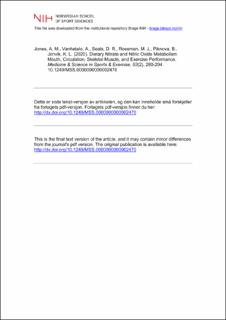| dc.contributor.author | Jones, Andrew M. | |
| dc.contributor.author | Vanhatalo, Anni | |
| dc.contributor.author | Seals, Douglas R. | |
| dc.contributor.author | Rossman, Matthew J. | |
| dc.contributor.author | Piknova, Barbora | |
| dc.contributor.author | Jonvik, Kristin Lundanes | |
| dc.date.accessioned | 2022-02-15T09:32:53Z | |
| dc.date.available | 2022-02-15T09:32:53Z | |
| dc.date.created | 2021-01-06T12:19:36Z | |
| dc.date.issued | 2020 | |
| dc.identifier.citation | Medicine & Science in Sports & Exercise. 2020, 53(2), 280-294. | en_US |
| dc.identifier.issn | 0195-9131 | |
| dc.identifier.uri | https://hdl.handle.net/11250/2979009 | |
| dc.description | I Brage finner du siste tekst-versjon av artikkelen, og den kan inneholde ubetydelige forskjeller fra forlagets pdf-versjon. Forlagets pdf-versjon finner du på journals.lww.com / In Brage you'll find the final text version of the article, and it may contain insignificant differences from the journal's pdf version. The definitive version is available at journals.lww.com. | en_US |
| dc.description.abstract | Nitric oxide (NO) is a gaseous signaling molecule that plays an important role in myriad physiological processes including the regulation of vascular tone, neurotransmission, mitochondrial respiration and skeletal muscle contractile function. NO may be produced via the canonical NOS-catalyzed oxidation of l-arginine and also by the sequential reduction of nitrate to nitrite and then NO. The body’s nitrate stores can be augmented by the ingestion of nitrate-rich foods (primarily green leafy vegetables). NO bioavailability is greatly enhanced by the activity of bacteria residing in the mouth which reduce nitrate to nitrite, thereby increasing the concentration of circulating nitrite which can be reduced further to NO in regions of low oxygen availability. Recent investigations have focused on promoting this nitrate-nitrite-NO pathway to positively impact indices of cardiovascular health and exercise tolerance. It has been reported that dietary nitrate supplementation with beetroot juice lowers blood pressure in hypertensive patients whereas sodium nitrite supplementation improves vascular endothelial function and reduces stiffening of large elastic arteries in older humans. Nitrate supplementation has also been shown to enhance skeletal muscle function and to improve exercise performance in some circumstances. Recently, it has been established that nitrate concentration in skeletal muscle is much higher than that in blood and that muscle nitrate stores are exquisitely sensitive to dietary nitrate supplementation and deprivation. In this review, we consider the possibility that nitrate represents an essential storage form of NO and discuss the integrated function of the oral microbiome, the circulation and skeletal muscle in nitrate-nitrite-NO metabolism as well as the practical relevance for health and performance. | en_US |
| dc.language.iso | eng | en_US |
| dc.subject | nitric oxide | en_US |
| dc.subject | oral microbiome | en_US |
| dc.subject | vascular health | en_US |
| dc.subject | muscle metabolism | en_US |
| dc.subject | exercise | en_US |
| dc.title | Dietary Nitrate and Nitric Oxide Metabolism Mouth, Circulation, Skeletal Muscle, and Exercise Performance | en_US |
| dc.type | Peer reviewed | en_US |
| dc.type | Journal article | en_US |
| dc.description.version | acceptedVersion | en_US |
| dc.source.pagenumber | 59 | en_US |
| dc.source.journal | Medicine & Science in Sports & Exercise | en_US |
| dc.identifier.doi | 10.1249/MSS.0000000000002470 | |
| dc.identifier.cristin | 1866248 | |
| dc.description.localcode | Institutt for fysisk prestasjonsevne / Department of Physical Performance | en_US |
| cristin.ispublished | true | |
| cristin.fulltext | postprint | |
| cristin.qualitycode | 2 | |
